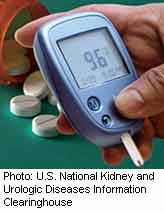- Could Your Grocery Store Meat Be Causing Recurring UTIs?
- Are You Making This Expensive Thermostat Error This Winter?
- Recognizing the Signs of Hypothyroidism
- 10 Strategies to Overcome Insomnia
- Could Artificial Sweeteners Be Aging the Brain Faster?
- Techniques for Soothing Your Nervous System
- Does the Water in Your House Smell Funny? Here’s Why
- Can a Daily Dose of Apple Cider Vinegar Actually Aid Weight Loss?
- 6 Health Beverages That Can Actually Spike Your Blood Sugar
- Treatment Options for Social Anxiety Disorder
Medicaid Expansion Spotted Many Undiagnosed Diabetes Cases

The number of people with newly diagnosed diabetes increased by 23 percent in states that expanded the number of low-income people who are eligible for Medicaid under the Affordable Care Act, a new study reports.
“The study demonstrated the benefit of new Medicaid coverage in identifying people with diabetes and initiating therapy in those historically not having health insurance,” Dr. Robert Ratner, chief scientific and medical officer for the American Diabetes Association, said in an association news release.
States that have chosen to expand eligibility for Medicaid — the government-run insurance program for lower-income people — now provide access to most non-seniors who make at or below 138 percent of the federal poverty level. That’s about $16,105 for an individual, according to the study researchers.
The study compared 26 states that had initially expanded Medicaid to 24 states that had not. The number of new diabetes diagnoses grew by 23 percent in the states that had expanded Medicaid, compared to less than 1 percent in the states that didn’t expand Medicaid coverage.
“Clearly, expanding Medicaid has allowed those 26 states that did so to identify a large number of people who previously did not know they were living with diabetes,” Dr. Vivian Fonseca, professor of medicine and pharmacology at Tulane University School of Medicine, said in a statement provided by the American Diabetes Association.
“Early identification can be potentially life-saving for people with diabetes, and can at the very least greatly increase the chances of preventing or delaying complications,” Fonseca added.
The study was published online March 23 in the journal Diabetes Care.
More information
For more about diabetes, visit the U.S. Centers for Disease Control and Prevention.
Source: HealthDay
Copyright © 2026 HealthDay. All rights reserved.










